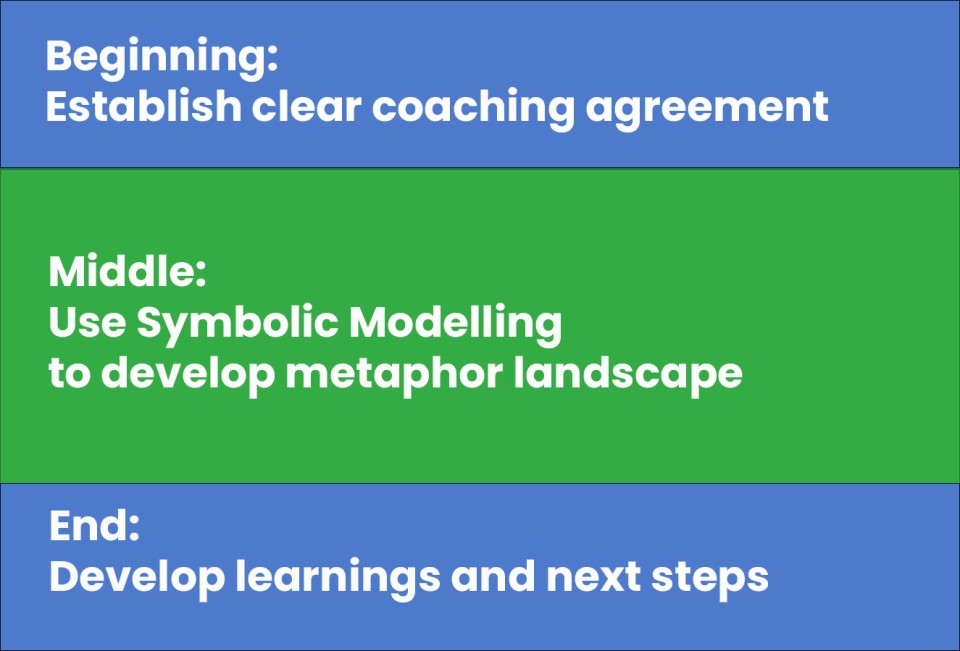Clean Language, Symbolic Modelling and the ICF Core Competencies
by Marian Way in Coaching, ICF, Symbolic Modelling

Some years ago, James Lawley put me in touch with Søren Holm and Lena Sobel, both of whom are coaches and trainers who live and work in Sweden. They had come across Clean Language via a couple of events run by Caitlin and James and now they wanted a trainer who was willing to go to Sweden to train them and their colleagues, the majority of whom were ICF (International Coaching Federation) coaches, in Clean Language. This was a fantastic opportunity to travel and to spread Clean Language, and so after several online meetings I was on my way to Sweden. I stayed with Lena in her lovely apartment in Västerås and the training took place in Stockholm. I even got to visit Søren’s home on one of the islands in the Stockholm Archipelago. It was sunny and beautiful and, being close to midsummer, the nights were very short. More trips followed, and inevitably I discovered that Sweden could also be bitterly cold and with very short days!
The training we delivered – Søren and Lena were soon assisting me – was a 3-day introduction to Clean Language for new coaches and existing ICF accredited coaches - and after a number of these trips Søren began wondering if it would be possible to create a Clean Language-based ICF accredited training that would allow people to start from scratch and become clean ICF accredited coaches. I said I thought this would be possible and we started experimenting with different ideas of how clean coaching could work. In conjunction with the ICF Core Competencies, we developed a model a bit like a ‘Symbolic Modelling sandwich’. An ICF-style clean coaching session starts with establishing a coaching agreement (or contracting) and during this part we use clean conversationally, developing words lightly and without attempting to turn them into metaphors. Once there’s a clear agreement, we employ Symbolic Modelling and develop the client’s desired outcome into a metaphor landscape, using all the skills that this involves. Then towards the end of the session, we return to more conceptual / conversational language as we discuss what the client has learned, how they’ll use that learning and what needs to happen next.

We ran the pilot of this new training in Stockholm in 2019, finishing just before Christmas with a wonderful celebratory evening with a smorgasbord, singing and even clowning. Søren applied for accreditation for the training and I worked on achieving my PCC accreditation, which came through in July 2021. I have also completed my mentor coach training with the Solutions Academy and the PCC Assessor training with the ICF.
Of course, all of this has involved a great deal of work and thought, which in turn has resulted in an ever-deepening understanding of the ICF Core Competencies and how these can be demonstrated cleanly. It has become really clear to me that once someone is able to use the Symbolic Modelling skillset well, they will automatically be demonstrating several of the competencies – cultivating trust and safety, maintaining presence, listening well and evoking awareness – to a high standard. For example:
- ‘Cultivating Trust and Safety’ includes ‘demonstrating respect for the client’s identity, perceptions, style and language and adapting one’s coaching to the client’.
- ‘Maintaining Presence’ includes ‘being comfortable working in a space of not knowing’.
- ‘Listening Well’ includes ‘integrating the client’s words, tone of voice and body language to determine the full meaning of what is being communicated’.
- ‘Evoking Awareness’ includes ‘asking questions that help the client explore beyond current thinking’.
This is just a small subset of the aspects that ICF coaching and Symbolic Modelling have in common; there are many more that can just as easily be mapped across.
As well as similarities between the ICF Core Competencies and Symbolic Modelling, there are also a few differences. Rather than go into each of these, I’m going to highlight the main one, which relates to the concept of ‘partnering’. The ICF definition of coaching is ‘Partnering with clients in a thought-provoking and creative process that inspires them to maximize their personal and professional potential’ and so naturally the word ‘partnering’ appears several times within the expanded list of competencies. (Each competency has a number of clauses, like the ones above.)
‘Partnering’ in this context means to give the client a choice about what happens in the coaching session, not just at the start, but throughout the session. So it’s more than the coach asking the client what they’d like to have happen and then using the client’s desired outcome to guide their navigation of the session. It’s about involving the client in the navigation itself. This means that as well as eliciting the client’s desired outcome for their life, their work, their relationships, or whatever - outside the session -, we also need to discover what the client expects to happen within the session, and how they will know they have achieved this. Are they expecting to come out of the session with a list, a strategy, a new metaphor, a different feeling about their situation or something else? And then once we – and they – know this, what would they like to explore first, in service of this outcome?
Partnering during the Symbolic Modelling part of the session is a bit trickier, since it presents us with a conundrum…
- On one hand, we want to keep the client in contact with their metaphor landscape, by keeping them in a light trance and minimising their cognitive load. We don’t want the client to have to think about what we are doing, or the navigation of the session; we want them fully immersed in the experiences they’re having, building relationships with the symbols in their metaphor landscape.
- On the other hand, we do want to offer the client maximum choice since this is one of the key principles of working cleanly. (James wrote a short blog post some years ago, called “Not making decisions for the client” in which he describes how we can inadvertently make decisions for the client by choosing to develop one of a client’s options, but not the other(s) and gives some suggestions for avoiding this.)
In order to honour both these ideas, we have identified some specific times within the middle part of the session when it’s a good idea engage in some partnering, for example:
- When a client expresses a problem, we might develop it a little and then ask, “And what would you like to have happen” – just as we do anyway when following the PRO model. Adding the word ‘next’ or ‘now’ (if appropriate) can make this more related to the session.
- If a client has two options they wish to explore, we can ask, “And [option 1] and [option 2] and when [option 1] and [option 2] which of these would you like to explore first?”
- If we have asked a client (once the contracting part of the session was complete), “Where would you like to start?” we can move forward in the direction of their request and if that request is met quite quickly, we can summarise and then ask, “And what would you like to have happen now?”
We can also partner with a client to end a session, with, “And we have a few minutes left, what would you like to have happen during these last few minutes?” (This is infinitely preferable than deciding you’d like to stop and just saying, “Is this a good place to stop?” As Caitlin has been saying a lot recently, this question is not at all clean, since it offers the client no choice at all.)
Of course, one of the benefits of partnering is that we make fewer decisions on behalf of our clients. I recall Søren telling me that when he first came across Clean Language, he was surprised to see how directive we were. And I was, in turn, surprised by his comment; I had never seen Clean Language as directive. But I had been focusing on what clean coaches aren’t doing (i.e. not adding in their own words, assumptions etc.) rather than what we are doing – directing attention to different parts of a client’s landscape and helping them to discover what’s behind / beneath the words they use. By developing our Clean Coach Certification Programme, we have found a way to include partnering in our clean coaching, to invite the client to choose (every so often) where we’ll direct their attention and give them more ownership of their session.
If you’d like to join us on our next Clean Coach Certification Programme, click here for a detailed description of the programme and then book a chat with me so I can answer any questions you may have and so we can think together whether / how this programme can work for you.
Related courses
About Marian Way
A highly skilled facilitator and trainer, Marian, who founded Clean Learning in 2001, has developed and delivered training across the world. She is the author of Clean Approaches for Coaches, co-author, with James Lawley, of Insights in Space and co-author, with Caitlin Walker, of So you want to be… #DramaFree.
Marian is an expert Clean facilitator, an adept modeller, a programme writer and an inspirational trainer. She has a natural ability to model existing structures, find the connections between them and design new ways for people to learn. Marian was a leading innovator within the Weight Watchers organisation, which included developing the “points” strategy, a local idea that went on to become a global innovation. She is a director of both Clean Learning and Training Attention CIC, world leaders in clean applications for corporate, educational and community development. She designs our programmes and workbooks, leads workshops and teaches on all our courses. She’s trained people in Great Britain, Russia, Sweden, Germany, Australia, Japan and the USA. Marian is also a recognised Clean Assessor.
- Blog categories
- A - Z of Clean
- Adventures in Clean
- Book Reviews
- Business
- Clean Ambassadors
- Clean Interviewing
- Clean is like ...
- Clean Language
- Clean Language Questions
- Clean Space
- Client Stories
- Coaching
- Creativity
- #DramaFree
- Education
- Health
- ICF
- Life Purpose
- Listening
- Metaphor
- Modelling
- Outcomes
- Practice Group
- Symbolic Modelling
- Systemic Modelling
- Training